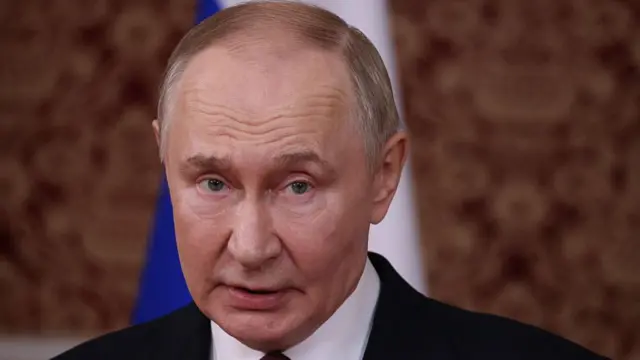Hungary still obligated to arrest people under ICC warrant – including Putinpublished at 14:32 BST
14:32 BST
 Anna Holligan
Anna Holligan
Reporting from The Hague
 Image source, Getty Images
Image source, Getty Images
Hungary’s withdrawal from the International Criminal Court (ICC) will take effect on 2 June 2026, a year after Prime Minister Viktor Orbán’s government formally notified the United Nations of its decision.
Under the court’s rules, Hungary remains bound by the Rome Statute until withdrawal takes effect — meaning it would still be obliged to arrest persons under ICC warrant, such as Russian President Vladimir Putin, should they enter its territory before June 2026.
For context: The ICC issued an arrest warrant for Putin over
war crimes allegations in March 2023, focusing its claims on the unlawful
deportation of children from Ukraine since the start of the war. Russia has
denied the allegations and labelled them as “outrageous”
Budapest has accused the Hague-based court of being politically motivated. The move makes Hungary the first EU member state to leave the ICC since it was founded in 2002.
In a statement, the Presidency of the Assembly of States Parties, which oversees the ICC, said it “regrets this turn of events,” adding that the decision “clouds our shared quest for justice and weakens efforts to fight impunity”.
The ICC has faced repeated challenges enforcing such warrants. South Africa failed to detain Sudan’s Omar al-Bashir during a 2015 visit, despite a warrant for war crimes and genocide.
Mongolia and Hungary also declined to arrest Israeli Prime Minister Benjamin Netanyahu during recent visits, prompting formal findings of “non-cooperation” by ICC judges.
However, there were no further sanctions or penalties.
The court relies on member states to carry out arrests, as it has no enforcement mechanism of its own.
Human rights observers note that failures to act on ICC warrants — often citing diplomatic immunity or domestic political concerns — undermine the court’s authority and embolden others accused of grave international crimes.

